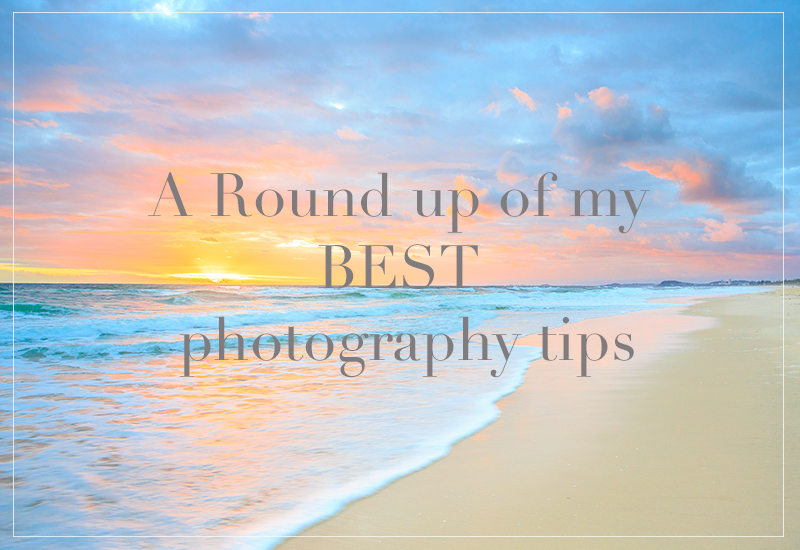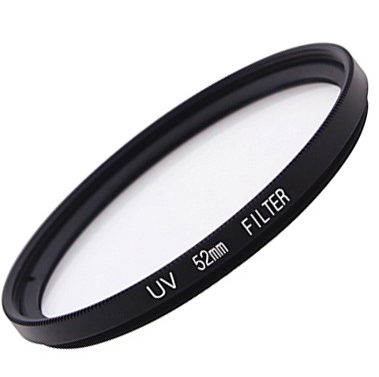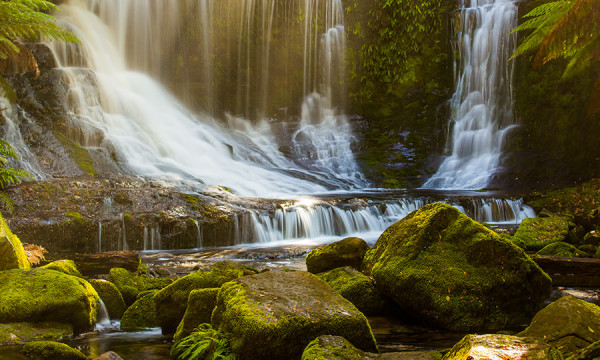If you’re not signed up to my newsletter then Shame on you! haha, just kidding. You are definitely missing out though because every week I giveaway a handy photography quick tip. Luckily though today Im feeling generous and thought I would share all the best ones in a handy blog post!

Lets start off with a tip that could save you hundreds of dollars! I recently pulled out my old trusty Sigma Wide Angle lens that I used to use only to discover that there was white fungus spots under the glass. Before you say EWW, gross, it is actually a common thing. Apparently it is caused from rapid temperature changes or condensation on the glass. So if you are out side in the freezing cold taking photos for ages, your camera and then lens are freezing cold and then you bring your camera back inside to a warm house or back into your car with the heaters pumping thats when it is going to occur and vice versa so without further ado:
1. Keep vitamin sachets in your camera bag
This may sound a bit weird but you know those little sachets that come in your vitamin bottles? Well save them up and throw them in your camera bag or wherever you keep your camera so that they soak up any moisture and condensation! Since I have added these sachets to my camera bag I haven’t had any more signs of fungus on my new expensive lenses, touch wood! The other thing would be to let your camera and lenses come back up or down to normal temperature slowly and give it a good wipe with a dry cloth if you notice any condensation on them.
2. Always carry a spare CHARGED battery
This might seem like an obvious one but I have been out photographing an amazing sunset when the battery in my camera died on me and my spare battery was flat also! I was devastated. As soon as I have a flat battery now I put it on the charge as soon as I get home because I don’t want to be in that situation ever again so make sure firstly that you have a spare battery and secondly that its always charged! I know photographers that carry 3 or 4 batteries with them at all times and its not a silly idea!
3. Back Up your photos
Another obvious one but one that people rarely do. Im guilty of it at the moment. I haven’t done a proper two hard drive back up since before I went to Canada. Backing up your photos is probably one of THE most important things that you can do if you love photography. There is nothing worse than having a computer or hard drive crash and losing all those precious memories never to recover them again. Whatever program you use to store and edit your photos make sure that you back up at least once a week. I use Lightroom and I have it set to backup every time I exit. I also have all my photos backed up on an external hard drive here at home plus another external hard drive that I keep off site. It may seem a little extreme but if my house caught on fire and burned down at least I would still have a copy of everything. Its not just my landscape photos, its my wedding photos, family photos and all kinds of precious memories. I treasure these pictures and I would be devastated if I lost any of them!
4. Keep a UV filter on each of your lenses
If you have expensive lenses then you have to invest in UV Filters for no other reason than to protect your lens. I don’t know about you but I would rather spend a couple of bucks on a UV Filter than have to replace my expensive lens if it gets scratched. A UV Filter can also protect your lens if you are taking photos at the beach and you accidentally get ocean spray or water on your lens.

5. Clean your equipment before your next shoot
When you’re a landscape photographer its really important to make sure your lenses and filters are clean before you head out on your next shoot. Its such a pain if you have been somewhere taking photos and you get home and notice all the photos have got spots all over them from dirty lenses and filters. Its now going to take you forever in post processing to remove these when you could have just started with clean equipment to begin with. Or say your heading out for a dawn shoot and after setting up all your gear you then realise there is ocean spray all over your lens. Its really hard to see before the sun comes up and a lot of the time it takes a bit of elbow grease to get ocean spray off your lenses and filters. A lot of the time it just smears everywhere. So make sure you prep all your gear before hand. Its also a good idea to keep a lens cleaning cloth in your camera bag to wipe over your lens and filters in between shots especially when you are trying to capture beach or waterfall shots and then is lots of mist in the air.
6. Maintain your tripod
Being a landscape photographer one of the most important pieces of equipment (apart from a kick ass camera) is your tripod. The only way to take long exposure photos is if you use a tripod and a good sturdy tripod can be expensive so you want to look after it as best as you can. They get covered in salt water and sand from being used at the beach or mud from being placed in lakes, creeks and river so when I get home from a shoot I always give it a wash down to get rid of any dirt and sand. The legs can start to get a bit stuck after a while of use so I wipe some coconut or olive oil over them periodically to keep them nice and smooth. And the smell of coconut oil makes me think Im at some tropical location next time I use it! Bonus!
7. Spare memory cards
Along with having a spare battery its really important to have a spare memory card and one that is empty. You never know when the memory card that is in your camera is going to pack it in or get full and it usually happens at the most inconvenient time. At least by having a spare memory card in your camera bag you can have peace of mind in case anything goes wrong!
8. Keep a plastic bag & towel in your camera bag
When you are out photographing seascapes and there are wild seas its a good idea to have a plastic bag that you can throw over your camera in case a rogue wave catches you off guard or it starts raining. Its handy to have a towel in your camera bag also to wipe down your equipment if it gets wet especially at the end of a shoot. It helps prevent corrosion happening to your prized possession which is of course your camera!
9. Change lenses as quickly as possible
When you are changing lenses no matter if you are outdoors in nature or inside your own home, try to do it quickly. This prevents dust and dirt from blowing onto the sensor inside your camera body and saves you an expensive trip to the camera cleaner guy. I always have the lens Im putting on as close to the body as I can so that its a couple of second changeover and Ive never once had to get my sensor cleaned yet! Touch wood (again)!
10. The sweet spot on your lens
If you have a DSLR Camera with different lenses its important to find the “sweet spot” on that particular lens. When I talk about the sweet spot I am referring to the most ideal aperture for getting the best clarity out of that lens. This is usually two F Stops down from the widest aperture that you’re lens can go. So for example; my 17 to 40mm wide angle lens has aperture of F4 at its widest so 2 stops down from that is F8 (I also use F11 a lot too). These are the aperture settings that I use 95% of the time. And my 50mm lens has and aperture of F1.8 at its widest, so I find I get the best shots at F2.8 and F4. Have a play around with some of your lenses and see if you can find the “sweet spot” of them!
So that rounds up my best photography tips for now. I will do another post soon when I have a more to add. Are there any other handy photography tips that you can think of? If so leave a comment below!





I started a camera club in my little rural town, to help us all learn, and the first thing I talked to them about where some of these rules. Especially the UV filter to protect the lens, spare batteries and memory cards. Great tips and love the articles as they help me learn. (Avid amateur )
haha, no probs Greg. The first thing I ever learnt was about the UV Filter and its one you wouldn’t even think of as a newbie photographer! All those tips are a good reminder for myself too! Its good to go over them now and again!
Wonderful post Larissa. Very new to the photography world, this information is extremely useful!
Thank you so much Cornelia! Glad I could be on some assistance! 🙂
These are great tips. I like the idea of having the vitamin sachets in the camera bag. That would be good for me as in winter our house gets cold and can get a bit of moisture in my room where my camera equipment lives. Also, when changing lenses, I always have my camera facing down so nothing can drop into the camera and get on the mirror or sensor. I find that helps most of the time too but owning a pug, sometimes hair can find its way in even using every precaution known to man.
hahaha, I know what you mean about the dog hair Kristy. Its a condiment in our house! And great idea about pointing the camera down when you are changing lenses! 🙂
Great tips, thanks for sharing these Larissa! Love your photos too 🙂
Thanks so much Jose! Glad you enjoyed the tips and the photos! 🙂
Wow – great tips & blogs. Thanks!!
haha, thanks Andrew. Glad you enjoyed it! 🙂
I love how accessible these tips are! I haven’t been paying enough attention to looking after my lenses. Yet! x
They are just good habits to get into Andrea. Especially the UV filter for your lens. I cringe when I see a butt naked lens these days! haha 🙂